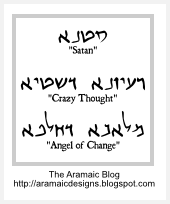“In Aramaic, the language spoken by Jesus, the word satan meant ‘crazy thought.’ When you are tempted to believe that you are not enough, that’s crazy thinking. Seducing yourself into believing you are superior to others is not sane thinking. We must free ourselves from the limitation of inferiority or superiority by rising to the realm of a clear perception of our true nature. Gently, and sometimes not so gently, the angel of change is telling us that it is time to trust in our capacity to let go, unfold, expand, evolve, awaken.” – Michael Beckwith – [source]
Wouldn’t it be nice if New Age mystics would cite their sources? Sadly, a thorough search didn’t turn up a single corroborating source, which is pretty much what we expected. For three thousand years, “satan” (in Aramaic “sāṭānā”) has meant “adversary”* stemming from a root that means “to be hostile.”* But for comparison’s sake, in Jesus’ dialect these terms are likely:
Peace,
-Steve
* – As attested by Brockelmann, Sokolof, Jastrow, Levy and many, many others.

thank you very much!
Ok I am not a student of Aramaic but Syriac and I accept though they are similar they sometimes describe Syriac as Literary Aramaic I haven’t been studying it that long. But I am a quick study am working through the Hymn of the Pearl I should be but any excuse eh. So I found this handy Syriac French English on line dictionary http://www.premiumwanadoo.com/cuneiform.languages/syriac/search.php
And I followed up with my Payne Smith. They preferred the root as STA pretty much what the on-line dictionary went for, adversary as one standing in the way, but you could move onto turn astray lead away. I think you are a little harsh with our new age friend Beckwith he seems harmless enough. STA as away with the fairies why not. But my current supervisor thinks I leap to the unhesitant emendation a little too quickly and some of the nuances I have found within roots within roots, well perhaps so lightly nuanced not everyone can pick up on their scents. In terms of process I feel with all due respect to one who has travelled further along the path, that your dismissal of the translation was closer to STA then ‘IRA, the Watchers which I find a rather refreshing attractive term for Angel/Messenger/King hmm. But perhaps I am having a crazy thought and have strayed too far from the true Way. May you be happy.
Oh and I have found a simple solution to the derivation crazy thought from Satan. You have to work with me here. But on working through the Hymn of the pearl (because it’s short) verse 50 came across the not uncommon word dio’ a demon from which is derived dion’ a demoniac, one vexed by a demon, and third suggestion by payne smith a madman. Was not Beckwith in a roundabout manner and possibly unawares alluding to the connection already made in the ancient world between demonic forces and what we now term trauma, syndromes, unconcious repression, the monsters of the id and what have you. Hegel gets away with some wild etymologies if you have something interesting to say I’ll play with you. But if you merely have a touch of the pedant about you, that might be less interesting for me. So I’d give full points to you but I’d offer Beckwith two points and a minority report in his favour which if it annoys you both is probably fair.
Perhaps he made an assumption based on modern pronunciation, and rather than looking for roots beginning with simkath (a la “sāṭānā”), he instead looked for cognates or roots beginning with shin. Understanding there will be some degree of difference in time and dialect, out of curiousity I checked the 1926 Syriac Lexicon of the NT. Shno (p227) means “to do things differently, deranged, out of one’s mind.” Similarly, eshtānāq means “was tormented”. Just an idea. (please forgive the deficiencies in my phonetic marks)